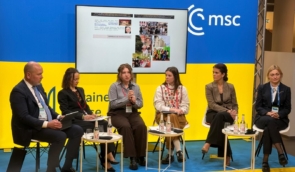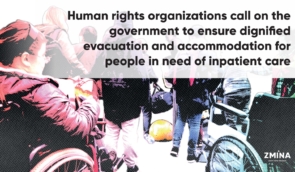Open appeal of human rights and media organizations for the anniversary of journalist Pavel Sheremet’s tragic death
July 20, 2017 is the anniversary of the journalist Pavel Sheremet’s murder. He was killed in a car explosion in the center of Kyiv. At the time, President Petro Poroshenko said solving this crime “a matter of honor” and stressed that “it is not only about the honor of the police, prosecutor’s office or the SBU, it is about the honor of the country”.

A joint investigative task force was created, drawing on the staff of the Main Investigation Department of the Ministry of Internal Affairs of Ukraine, and led by the head of the National Police of Ukraine. The Office of the Prosecutor General of Ukraine provided procedural guidance to the investigation, and the Security Service of Ukraine (SBU) also executed investigators’ orders in as part the investigation into a premeditated murder.
In 2017, the Ministry of Internal Affairs publicized at a press conference significant figures on the number of interrogated persons, video materials processed, investigative actions and expert assessments. Yet looking at the results of an entire year investigative activities, we are cannot avoid the assessment that the investigation has been ineffective.
We understand that an effective investigation of a crime implies much more than the competent authorities finding the guilty parties. Rather, we are concerned about the authorities’ duty to ensure that the investigation is carried out in a manner that can identify the perpetrators and lay the foundation for bringing them to justice.
Journalists from the “Investigation.Info” project and the International Organized Crime and Corruption Reporting Project conducted a joint investigation for their film, “Killing Pavel.” Their research found several key gaps in the official investigation, which suggest that the authorities have not taken all available measures to gather evidence.
In particular, the investigation did not identify and interrogate any important witnesses who were present at the crime scene. Investigators did not request key surveillance video footage taken on the eve, which showed a man and a woman who appeared, in other surveillance footage, to have been staking out Sheremet’s home in the four days before the murder.
And only after the May 2017 release of the film did the police question Igor Ustymenko, an ex-employee of the SBU, who allegedly was seen on surveillance camera footage outside Sheremet’s apartment building the night before the murder.
The failure to promptly follow up on these leads and to secure relevant forensic video evidence puts into doubt the effectiveness of the investigation and undermines public confidence in it.
Ukraine has a legacy of impunity for in attacks and murders of journalists related to their journalism work. Georgy Gongadze, Igor Aleksandrov, Boris Derevianko – are just a few from the list of those killed in crimes whose perpetrators have not been brought to justice. Therefore, we are convinced that without a radical change in the investigation process, despite all assurances of senior government officials, the investigation will bear no result.
In view of the above, and emphasizing the special public interest in this investigation, we urge the President of Ukraine, the Minister of Internal Affairs of Ukraine, the Prosecutor General of Ukraine and the Head of the Security Service of Ukraine to immediately take the following actions:
- To invite to work as a full participants in the joint investigation team highly qualified criminal investigators, prosecutors and detectives from the member states of the European Union, the United Kingdom, and the United States;
- Ensure transparency of the investigation so that there can be public scrutiny of it, and carry out regular quarterly public reports about the course of the investigation.
We are also asking the European Union, the United Kingdom of Great Britain and the United States to provide the necessary assistance, and to facilitate the involvement of international experts in the investigation.
We believe the above steps will help to guarantee the investigation’s integrity and effectiveness.
The investigation into Pavel Sheremet’s murder has become a litmus test of the ability of the Ukrainian authorities to investigate attacks on media freedom, which in turn is a prerequisite for the democratic transformation of Ukraine.
Oleksandra Matviychuk, Chairman of the Board of the Center for Civil Liberties
Oksana Romanyuk, Executive Director of the Institute of Mass Media
Cristophe Deloir, director general of Reporters Without Borders
Tetyana Pechonchik, Chair of the Human Rights Information Center
Oksana Pokalchuk, Director of Amnesty International in Ukraine
Lyubov Akulenko, Executive Director of the Ukrainian Institute for European Policy
Vadym Pyvovarov, Executive Director of the Association of Ukrainian Human Rights Monitors on Law Enforcement
Volodymyr Shcherbachenko, Chairman of the Eastern-Ukrainian Center for Civic Initiatives
Oleksandr Lemenov, Founder of the Center for Local Self-Government
Vadym Mysky, Director of the Laboratory for Democratic Transformations
Svetlana Kononchuk, Executive Director of the Ukrainian Center for Independent Political Research
Tamila Tasheva, co-founder of CrimeaSOS NGO
Anatoly Zasoba, Chairman of the Board of the Crimean Diaspora NGO
Oksana Nechyporenko, head of Global Office
Inna Borzillo, Executive Director of Center UA NGO
Dmytro Romanovich, Head of the Center for Reform Promotion
Maria Tomak, Coordinator of the Media Initiative
Daryna Kalenyuk, Center for Combating Corruption
Dmytro Sinchenko, chairman of the NGO “Association of Political Sciences”
Igor Kozub, Head of NGO “Volunteer Association of Participants of Maidan and Fighting Action”
Olena Sinchenko, Executive Director of the Center for Ukrainian Policy “Exampey”
Yurii Dmytriev, Head of NGO “Public Control of Kirovograd Region”
Mykola Kozyrev, Chairman of the Board of the Public Committee Human Rights Protection
Lyudmyla Kozlovska, President of the Open Dialogue Foundation
Lesya Shevchenko, President of the Open Society Foundation
Iryna Movchan, Director of the Ukrainian Educational Center for Reforms
Iryna Bekeshkina, Director, Ilko Kucheriv Democratic Initiatives Foundation
Andrii Kulikov, Chairman of the Journalism Ethics Commission
Viktor Taran, Head of the Center “Eidos”
Artur Rudzytsky, President of the Association of European Journalists-Ukraine
Volodymyr Tykhyi, NGO “#BABYLON’13documentaries”
Serhii Tomilenko, Chairman of the National Union of Journalists of Ukraine
If you have found a spelling error, please, notify us by selecting that text and pressing Ctrl+Enter.















